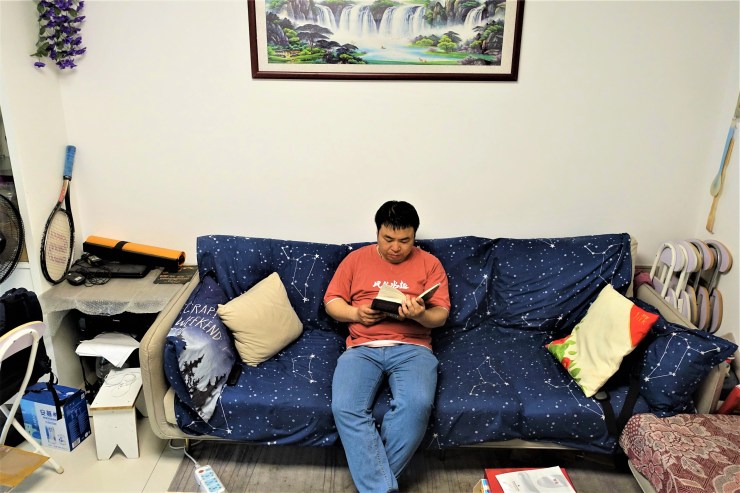Hamartia Antidote
ELITE MEMBER

- Joined
- Nov 17, 2013
- Messages
- 35,188
- Reaction score
- 30
- Country
- Location

Fading job prospects discourage younger Chinese workers
China's job market remains competitive as the economy recovers from zero-COVID. But some young people have lost their eagerness to compete.
Ahead of the Lunar New Year in January, Cheng Shi was geared up to see family and friends and excited about all the delicious food he would eat. Then, his manager at work pulled him in for a chat.
“They said the company was facing ‘operational difficulties,’ and they might need to adjust and optimize,” Cheng said. “I knew what they meant.”
They meant he would be out of a job soon.
Cheng wasn’t all that surprised. In the last few years, regulations have tightened around fintech and the tech sector. There have been investigations into Big Tech, and U.S.-China relations have been poor. He said many friends and ex-colleagues have been laid off or seen their salaries cut recently.
“In Hangzhou, the IT sector has reached its peak. The pandemic just made the situation even worse,” Cheng said.
China’s economy grew 4.5% in the first quarter year-on-year. The recovery has been patchy since China abandoned President Xi Jinping’s tough zero-COVID policy in December. Ongoing U.S.-China tensions, Russia’s war in Ukraine and a feared second COVID wave have weighed on the economy. That has left a lot of people out of work. In April, the unemployment rate was 5.2%, high for China, and even worse for new graduates at 20.4%.

Cheng is afraid to tell his parents he has been laid off.
Further west in another Chinese city, a university student, who did not give her name because she said she has been monitored by her college and the police, is having a rethink about joining the rat race after nearly three years of Beijing’s zero-COVID policy.
She beat millions of candidates to get into one of China’s top universities.
Over a tiramisu and coffee, she said that even when her university city was past the lockdown, all students were forced to stay on campus. That was true of a lot of universities in China over the last three years.
“In case there was an infection on campus, I think the university didn’t want to be held responsible,” the student said.
She would sneak out to have a drink or catch a movie with friends. Eventually, she got caught. Then, the school pressured her roommates to report her if she left. The freshman attempted to take her own life.
She said her school only pretends it cares about mental health.
“The university organized an event asking students to post messages that have positive energy. The event was called Say No to Emo, ‘Emo’ being emotions,” she said. “I felt like the school was depriving us of our right to be sad. Like, if we’re sad under these restrictions, it’s our problem.”
The college kept her under surveillance, she said. It tried to censor her on social media by calling her in, even if she just forwarded posts that called for help during the lockdown.
When she wanted to join the protests against COVID restrictions, which broke out in multiple Chinese cities, the university called and stopped her. She sneaked off campus one more time before the school told her to defer her sophomore year.
Now, her parents are worried about her future job prospects because every year a record number of graduates enter the workforce — this year there are 11.6 million graduates. However, the student is not anxious.
“I’m not that worried because I don’t need to find a job that my parents consider stable. I could just as well work at a bar,” she said.
This attitude is referred to in China as “laying flat,” akin to opting out of the rat race. China’s leaders see laying flat as a threat to the nation’s economic future.
Even tech billionaire Zhou Hongyi — someone as famous in China as Jack Ma is internationally — has spoken out against laying flat. He recently criticized young people for not wanting to put in the effort and having the wrong attitude toward work.
“Young people shouldn’t be so picky about their jobs,” he said during a livestream broadcast May 7.
A comment below his video by user Miracle of the Rabbit hit back: “Once I’m 35, no one will want to hire me. So of course I need to find jobs that pay me well now.”
Indeed, age discrimination is a problem in China.
“Frankly, companies think 35 and over is too old because they don’t need as many workers as they used to. And last year’s graduates plus this year’s graduates means there are well over 10 million young people looking for work,” Cheng said.
Relative to older colleagues, he said, young workers are cheaper and have better health to handle the overtime demands baked into many sectors.
“Age is a big obstacle in my job hunt. I am turning 40 soon. Of course, I feel the pressure, but I don’t want to think about this too much. I just need to keep my job search going,” Cheng said.
He said he has applied to 100-plus jobs. Fewer than a third of the companies have replied so far. And he has secured zero interviews.


